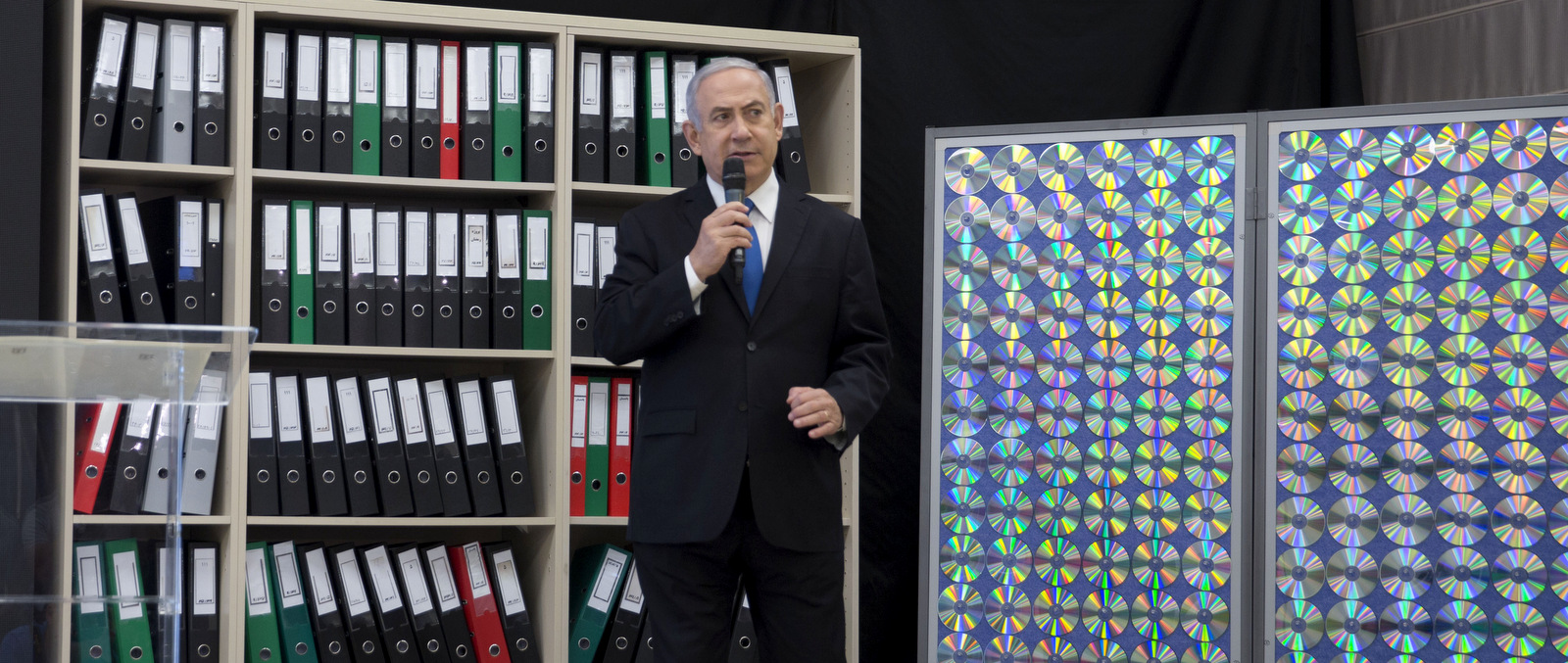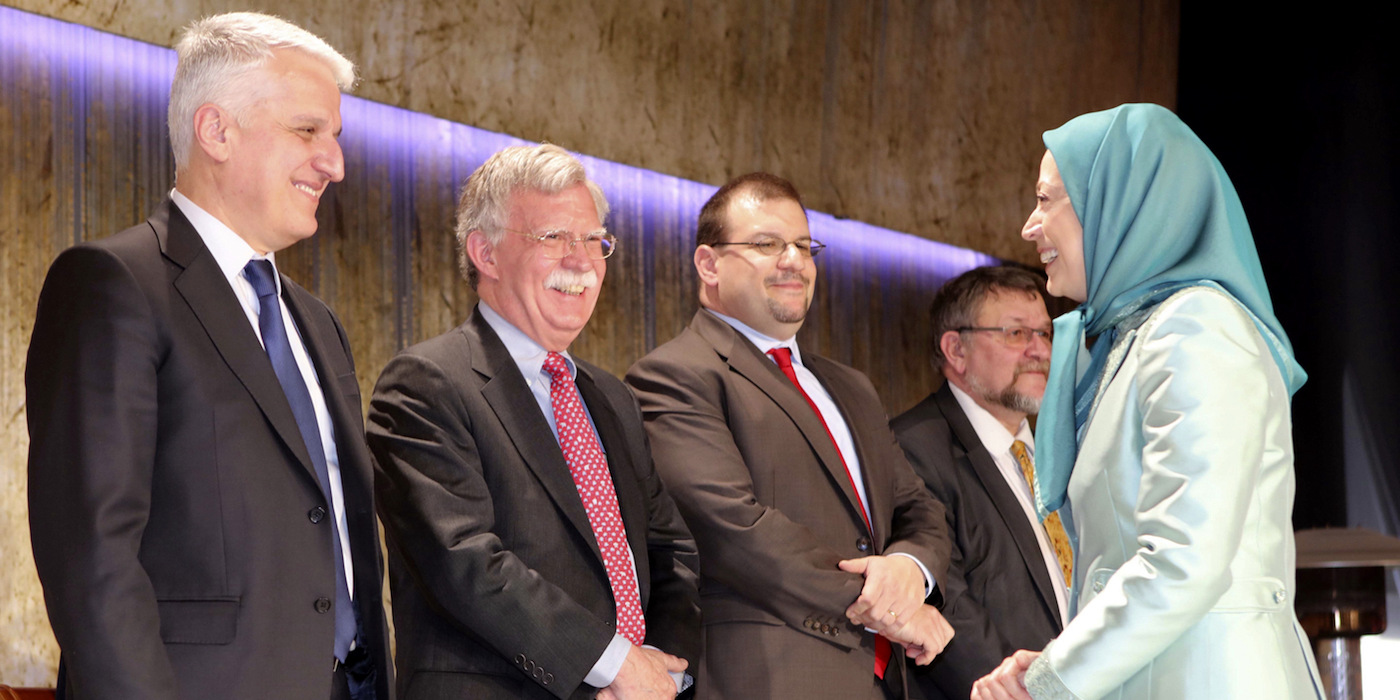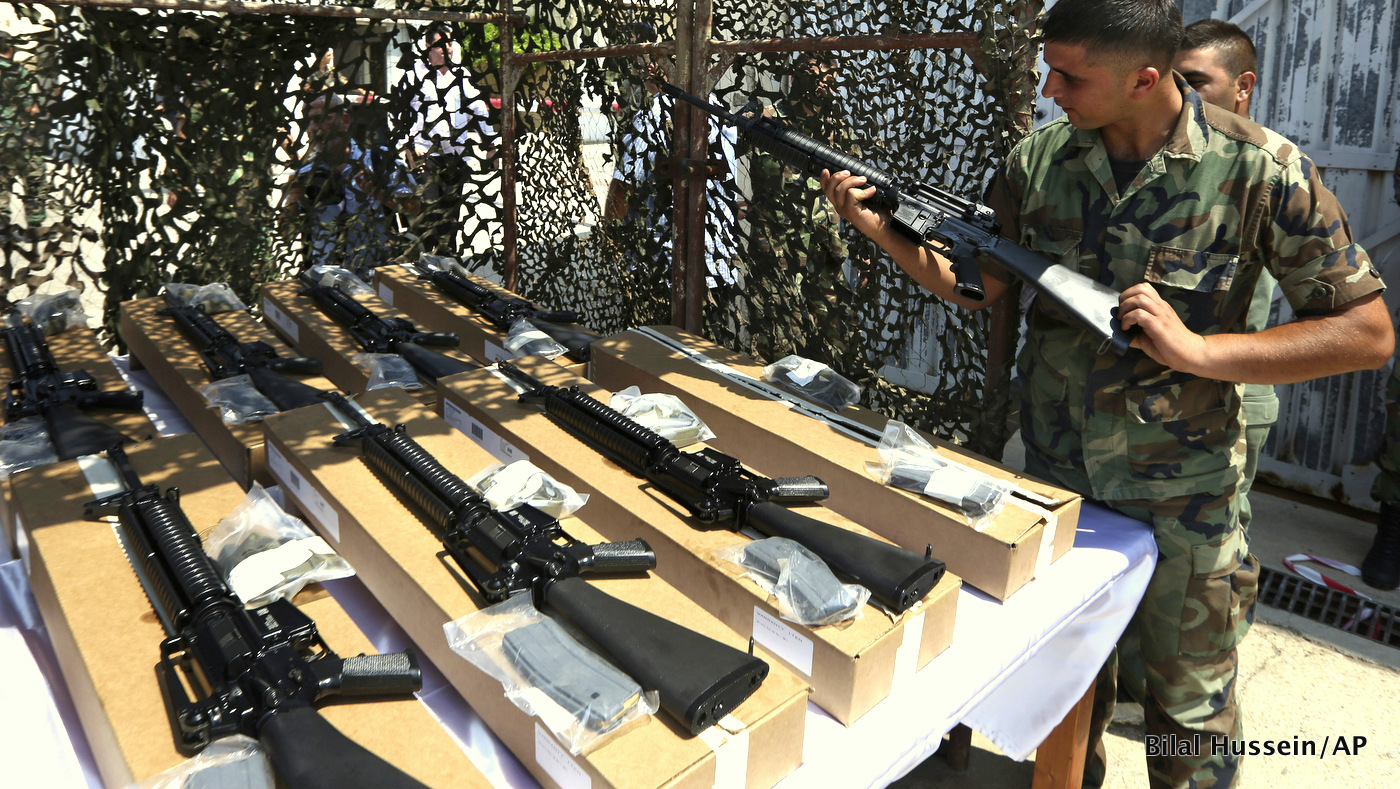WASHINGTON — President Donald Trump’s recent decision to withdraw the United States from the Joint Comprehensive Plan of Action (JCPOA), better known as the Iran nuclear deal, was hardly a surprise given that Trump and his administration had hinted for months that the U.S.’ participation in the deal was in its final days. Yet, while the Trump administration’s resolve to destroy the agreement has long been clear, what is less obvious – and much more important – is what comes next.
Since Trump’s election to the presidency, his rhetoric towards Iran and the Iran nuclear deal has prompted speculation that killing the deal was merely the first step of a plan intended to increase hostilities with the Iranian government, leading to a return of sanctions, at best, or war, at worst. Both of those tactics are ultimately aimed at achieving regime change in Iran, meaning that the lack of consensus in Washington, in terms of what follows U.S. withdrawal from the deal, is a tactical one about how to best pursue that goal — whether through military conflict or more “passive” tactics like sanctions and support for Iranian opposition groups.
However, the U.S.’ unilateral decision to pull out of the agreement may not have the intended effect of sabotaging the deal, complicating U.S. ambitions aimed at regime change in the Islamic Republic and further isolating the U.S. on this issue. On Tuesday, soon after Trump’s announcement, Iranian President Hassan Rouhani announced that Iran would consider continuing to be obliged by the deal regardless of the U.S.’ withdrawal, as long as the other signatories continued to keep their end of the bargain.
“Either what we demand from the JCPOA is fulfilled by the non-American [parties, and in that case] the U.S. withdrawal will be the removal of a trouble, or we [will resort to] our legal and rational option… if what we expect is not fully accomplished,” Rouhani stated at a meeting in the Iranian city of Mashhad.
This possibility is increasingly likely given that the other major signatories of the deal – the U.K., Russia, China, France and Germany – had desperately tried to prevent an American exit from the deal and have since announced their efforts to salvage it without U.S. involvement. Were the Iran nuclear deal to be salvaged despite U.S. and Israeli attempts to sabotage it, the U.S.’ unilateral withdrawal from the agreement would only further isolate the United States in issues of global political importance and complicate U.S. and Israeli plans to increase hostilities with Iran.
For that reason, Israel’s recent actions towards Iran, particularly military actions targeting Iranian assets positioned within Syria, suggest that there are efforts underway to sabotage the deal and a peaceful, diplomatic resolution to hostilities by provoking Iran into a regional military conflict. Such concerns were recently confirmed by U.S. government officials.
A much larger agenda

Israeli Prime Minister Benjamin Netanyahu presents material he claims comes from on Iranian nuclear weapons development during a press conference in Tel Aviv, Israel, April 30, 2018. (AP/Sebastian Scheiner)
With Israel paving the way for a military confrontation with Iran, those elements of the U.S. political establishment that have long pushed for war with Iran are using the U.S.’ recently announced withdrawal from the Iran deal to again push for regime change in Iran through military confrontation.
For instance, many prominent U.S. politicians have voiced their support for Israel to bomb Iran over the years while others have called for the U.S. itself to go to war against Iran. Several of those advocates for war with Iran are now part of the Trump administration, most notably Secretary of State Mike Pompeo and National Security Adviser John Bolton.
Among the “Iran hawks” in the Trump administration, the most dangerous is arguably Bolton. As journalist Gareth Porter recently noted, from 2002 to 2004, while he was the Bush administration’s key policymaker on Iran, John Bolton — by flouting State Department protocol and taking several unannounced trips to Israel — “actively conspired […] to establish the political conditions necessary for the administration to carry out military action [against Iran].”
Bolton has also continued to accuse Iran of having a covert nuclear weapons program, an accusation for which there is no evidence, as both Israeli intelligence and U.S. intelligence have long — though not publicly — acknowledged that Iran has had neither the intention nor the capability of developing a nuclear weapon.
Despite this, Bolton has called repeatedly for the preemptive bombing of Iran, not because he wishes to stop a weapons program that does not exist, but oust the current government of Iran. Indeed, Bolton has long maintained that the U.S. “should be vigorously pursuing regime change in Iran,” a position he has since repeated throughout the course of this year.
In addition, well-known neoconservatives, who have gained influence under Trump, have long pushed for a military conflict with Iran in order to oust its current government. For instance, while the Iran deal was being negotiated, Gary Schmitt, a co-founder of the infamous Project for a New American Century, and Jamie Fly, former member of George W. Bush’s National Security Council, argued in Foreign Policy:
If the United States seriously considers military action, it would be better to plan an operation that not only strikes the nuclear program but aims to destabilize the regime, potentially resolving the Iranian nuclear crisis once and for all.”
This argument – common in neocon circles – underscores that regime change, not curbing Iran’s alleged nuclear ambitions, is the ultimate goal of U.S. foreign policy towards Iran.
The MEK buys U.S. admirers

John Bolton, second left, with Maryam Rajavi, former leader of the MEK, pictured right, in Albania at a 2017 Nowruz celebration. (Photo: Siavosh Hosseini/NurPhoto)
Part of the U.S.’ strong support for regime change is a result of how one Iranian opposition group in particular has courted powerful U.S. politicians over the years: the Mujahedeen Khalq (MEK), which was listed a “Foreign Terrorist Organization” by the United States government from 1997 through 2012 and, in the past, has conducted terror acts to accomplish its goals, killing Iranians as well as Americans in the process.
However, since its removal from the government’s terror group list, the MEK has sought to reinvent itself as a “moderate” Iranian opposition group under the name “the National Council of Resistance of Iran” even though it has next to no support within Iran and has consistently been characterized as both “cultish” and “authoritarian.” Yet, old habits die hard, as shown by the group’s recent collaboration with Israeli Intelligence to murder Iranian scientists.
The MEK has found significant support from within the U.S. political establishment, as it has cultivated a lengthy list of powerful “admirers” by offering lucrative fees to U.S. political figures in exchange for speeches to the group, some as short as five minutes. Among those admirers is Rudy Giuliani, who has long received money from the group, even when it was still classified as a terrorist group by the U.S. government.
Giuliani, an informal advisor of the Trump administration and new Trump attorney, has unsurprisingly called for regime change in Iran on several occasions — most recently this past Saturday, when he told reporters in Washington that Trump was “committed to regime change” in Iran and directly linked the president’s decision to remove the U.S. from the nuclear deal to the pursuance of regime change. Giuliani further underscored the Trump administration’s commitment to regime change in Iran by asserting that removing the current government from power was “more important than an Israeli-Palestinian deal” and was the only way to achieve peace in the Middle East.
Giuliani is hardly the only political figure close to Trump who is also close to the MEK. Trump’s Secretary of Transportation, Elaine Chao, received $50,000 in 2015 for a five-minute speech to the group, while Trump advisor and former House Speaker Newt Gingrich also shares ties to the group. However, among the most influential MEK supporters who have the president’s ear is Bolton himself, who has sought to rally support for the MEK for the last several years and has repeatedly misrepresented the group as a “democratic” Iranian opposition group.
At an MEK gathering in France last year, Bolton told supporters and members of the group:
The declared policy of the United States should be the overthrow of the mullahs’ regime in Tehran. […] The behavior and the objectives of the regime are not going to change and, therefore, the only solution is to change the regime itself. […] And that’s why, before 2019, we here will celebrate in Tehran!”
With Bolton holding great influence over the president’s Iran policy, as he controls the national security information that Trump sees on a daily basis, his call for regime change in Tehran before 2019 suggests that the U.S. withdrawal from the Iran nuclear deal is merely a precursor to the long-sought goal of regime change in Iran.
Some would rely on sanctions, though their ranks have been thinned
While Israel and some notable figures in U.S. politics seems to be gunning for a military conflict with Iran, such a confrontation lacks unanimous support in the U.S. government. Indeed, Trump’s Secretary of Defense, James Mattis, has notably opposed a U.S. withdrawal from the Iran deal. Former National Security Adviser H.R. McMaster and former Secretary of State Rex Tillerson, both of whom were recently replaced with Iran hawks Bolton and Pompeo respectively, had also supported the deal, positions which likely influenced their removal from the Trump administration.
Yet, while a military conflict with Iran lacks unanimous support in the U.S. government, regime change continues to be the ultimate goal in terms of U.S. policy towards Iran. Those opposed to an open military conflict have sought, however, to return to the tactics that preceded the Iran deal that were also aimed at regime change: sanctions.
Sanctions have already been announced as the Trump administration’s immediate response to its withdrawal from the Iran deal: Trump promised to reimpose the “highest level” of sanctions against Iran while Bolton stated that additional sanctions would also be put into effect. As several political analysts have since noted, at the core of this response is regime change in Iran, as proponents of sanctions against Iran assert that ramping up sanctions will increase popular discontent and lead Iran’s government toward collapse.
Neoconservatives have long used sanctions against Iran as a smokescreen for regime change. For instance, in 2012, Mark Dubowitz, executive director of the Sheldon Adelson-funded neoconservative think tank the Foundation for the Defense of Democracies, wrote of the U.S. sanctions then in effect against Iran:
If we are going to pursue tougher international sanctions against Iran — and we should — the goal should be regime change in Iran, not stopping proliferation.”
Thus, the target of sanctions is not Iran’s nuclear program but the Iranian government itself. The sanctions – from the U.S. perspective – are aimed more at generating domestic unrest via foreign-imposed economic hardship, not necessarily at curbing Iran’s nuclear program. This was seen earlier this year, as economic issues resulted in protests throughout Iran. The U.S. response to that economic unrest was to push for new sanctions that would further worsen economic hardship in Iran and increase the likelihood of larger protests that could be used to weaken the Iranian government. In addition, recent U.S. sanctions against Iran prior to the U.S.’ withdrawal from the nuclear deal have largely targeted members of the Iranian government and military, again emphasizing how sanctions are aimed at destabilizing the government, not the country’s nuclear program.
However, the return of pre-JCPOA sanctions is unlikely to have the same effect as the sanctions did prior to the negotiation of the Iran nuclear deal. Iran’s economy, as a result of past sanctions, has diversified and its warming relations with European countries as well as Qatar have allowed Iran to expand its exports of natural gas to the European Union and elsewhere, enabling Iran to more effectively weather the effects of sanctions imposed solely by the U.S. Indeed, European nations are already working to protect European companies from U.S. sanctions targeting Iran.
Thus, the other signatories of the Iran deal are unlikely to join the U.S. in imposing sanctions against Iran, as they now have a vested economic interest in maintaining economic relations with the Islamic Republic. The likely absence of European cooperation suggests that such “passive” attempts to push Iran towards regime change will prove ineffective. This, of course, opens the door for a U.S.-backed military solution to effecting regime change in Tehran.
Regime change at the end of every U.S. vista

A Lebanese army soldier inspects the first shipment of weapons to Lebanon to help bolster its military as it faces a growing threat from ISIS.
Regardless of whether the U.S. decides to pursue regime change in Iran through an “Iraq-style intervention” or the imposition of harsh sanctions, such efforts are inevitable given the policies of the current administration. Indeed, one of the driving forces behind Trump’s decision to remove the U.S. from the deal is that the deal increased the possibility of the long-term continuation of the current Iranian government, thereby delaying or preventing its removal and replacement with a government friendly to U.S. interests.
In the meantime, the end of U.S. involvement in the Iran nuclear deal will certainly aid U.S. weapons sales to the Middle East and the goals of U.S. allies in the region. For instance, Israel will continue to be able to use Iran as a “boogeyman” to justify Israeli aggression against its neighbors, namely Lebanon and Syria, as a means of countering Iran, despite the fact that such aggression ultimately amounts to a resource grab through the attempted annexation of Syrian and Lebanese territory.
The current Iranian regime as the regional “boogeyman” also allows Israel to continue to justify its need for massive amounts of U.S. military aid, which currently amounts to $10 million a day, while also prompting increased weapon sales to other U.S. allies in the Middle East, like Saudi Arabia.
However, regime change in Iran is much more appealing in the long-term to Israeli, U.S. and Saudi interests, as the end of the Iranian government would effectively eliminate the so-called “resistance bloc” in the Middle East that opposes Western imperialism in the region. With the heart of that resistance out of the picture, the U.S. and Israeli bid to “remake” the Middle East would quickly shift from a neocon fantasy to reality.
Top Photo | Donald Trump waves to the crowd after speaking during a rally opposing the Iran nuclear deal outside the Capitol in Washington, Sept. 9, 2015. (AP/Susan Walsh)
Whitney Webb is a staff writer for MintPress News and a contributor to Ben Swann’s Truth in Media. Her work has appeared on Global Research, the Ron Paul Institute and 21st Century Wire, among others. She has also made radio and TV appearances on RT and Sputnik. She currently lives with her family in southern Chile.
The post Trump Blows Up Iran Nuclear Deal, Aims Next at Blowing Up Iranian Government appeared first on MintPress News.
